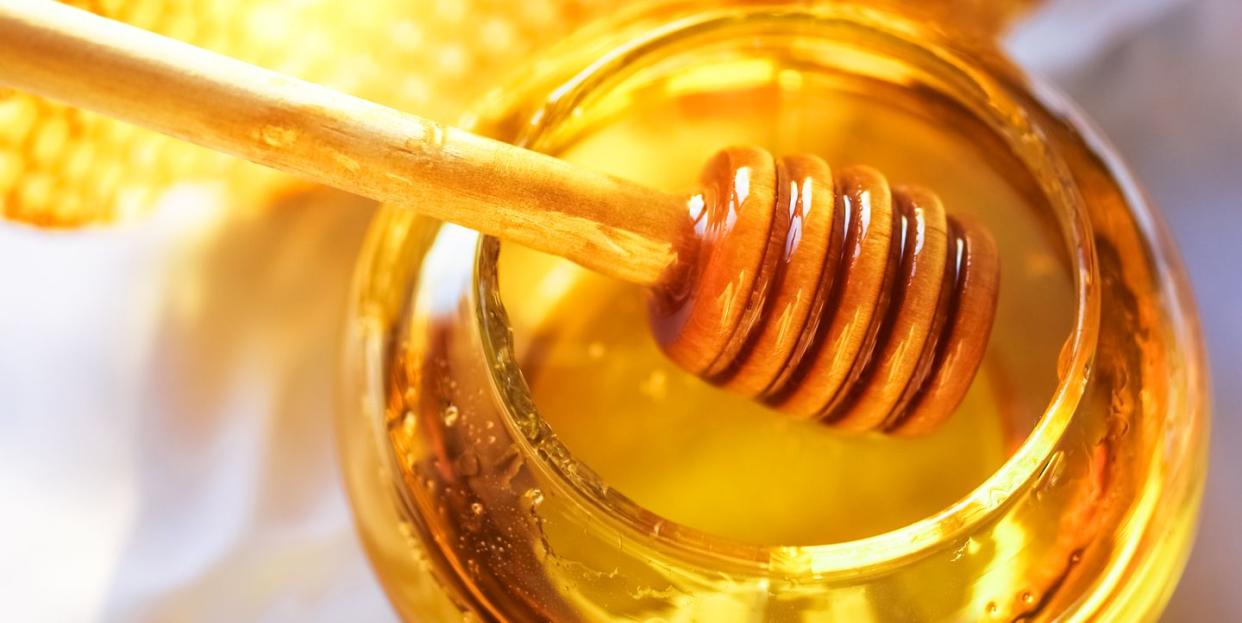Are There Really Any Health Benefits to Manuka Honey for Athletes?

If you’ve ever picked up a bottle of honey only to be floored by the $20 price tag, you’ve likely encountered manuka honey. This luxe honey comes from bees that feed on the manuka bush in New Zealand. It will cost you a pretty penny based on the sheer fact that it’s in low supply, but many are willing to pay the price because of its supposed “superfood” status.
Manuka honey is thought to have antibacterial properties, and some even use it to heal wounds or fight acne. Some claim that manuka is exceptionally rich in antioxidants and may fight off postworkout inflammation. But research is lacking to back up many of these claims, so let’s take a deeper dive into this honeypot and decipher the facts from the fiction.
Why is manuka honey so special?
Besides the fact that manuka honey is derived from one specific plant, it has some other qualities that make it stand out. Because honey is rich in sugar and has a low pH, it’s able to thwart bacterial growth. Yet, manuka honey has a compound called methyl glyoxal (MGO), which comes from the phytochemical found in the nectar of certain flowers in New Zealand. MGO has some toxic properties, but there is no evidence to suggest that is damages human cells. On the contrary, manuka honey appears to be damaging to bacterial cells, which promotes healing.
Manuka honey also contains a group of antioxidants called phenols, and these contribute to the antibacterial and anti-inflammatory properties of the honey. “It has higher levels of antioxidant phenolic compounds than other honey, so it has been shown to contain strong antimicrobial properties,” says Ginger Hultin, M.S., R.D.N., spokesperson for the Academy of Nutrition and Dietetics and owner of Champagne Nutrition.
The higher the MGO, the more antioxidants it contains. When picking up a bottle of manuka honey, you may even see the MGO number listed on the front of the packaging.
Yet, with these benefits, it’s important to remember that manuka honey is a sugar—one tablespoon has 70 calories and 16 grams of sugar, without any protein or fiber. And while cyclists do have a bit more wiggle room when it comes to sugar intake—it gives you the energy you need to fuel your workouts—it should be treated like any other added sugar. (The American Heart Association recommends men consume no more than 36 grams of added sugar a day and women consume no more than 25 grams.)
What does the research say about manuka honey?
Although the antibacterial and antioxidant properties of manuka are impressive, the human research is lacking. There are a few animal studies that signify that this might be a food trend worth watching, but just remember that results in animals are not always representative of potential results in humans.
1. It may be able to help heal wounds.
Since honey is known for its antibacterial properties, it has been used as a wound healing agent for centuries. Recently, there has been some human research to determine whether or not manuka honey has medical applications. A 2017 study in patients undergoing eye surgery compared how topically applying manuka honey versus Vaseline would affect wound healing. Manuka honey actually resulted in less noticeable scars and decreased scar stiffness, as compared to Vaseline. Obviously more research is needed before you start slathering manuka honey on open wounds, but the results are promising.
2. It may be able to help treat cancer.
Because of the rich antioxidant properties in manuka honey, scientists have looked at its potential for treating cancer cells. A test tube study on mouse cancer cells found that a combination of manuka honey and paclitaxel—a chemotherapy drug—inhibited tumor growth by 33 percent. Although these results are interesting, the cells that received just the chemotherapy drug experienced a 61 percent reduction in tumor growth. In other words, much, much more research is needed before any conclusions are drawn.
What are the benefits of manuka honey for cyclists?
“Manuka or not, all honey is a type of carbohydrate and using it to fuel physical activity can help energy utilization and performance,” Hultin says. She also notes that the antioxidants in manuka honey may help relieve postexercise inflammation. Although, since this has not been studied, it’s unclear how much honey you would need to eat to see a significant difference. You can probably get the same antioxidant bang-for-your-buck by eating plenty of fresh fruits and vegetables.
Los Angeles-based registered dietitian Mascha Davis, M.P.H., R.D.N., adds that Manuka honey is well-studied for wound healing and its antimicrobial properties, so if cyclists have wounds, it could potentially speed up the healing process.
[Build a killer midsection in the kitchen for powerful, effortless miles on the road with Eat for Abs!]
How should you use manuka honey?
“If you want to use manuka honey, I suggest adding it to your preworkout fuel, since it’s high in antioxidants,” Hultin says. Like any other type of honey, you can add it to smoothies, drizzle it on toast or over yogurt or oatmeal, or use it in a cup of tea.
“However, considering the high price, it might be unrealistic to use it frequently. Plus, only very pure, medical grade manuka honey will have these beneficial properties,” notes Davis. So be sure to read the labels (and price tags) closely before choosing the best honey option for you.
You Might Also Like